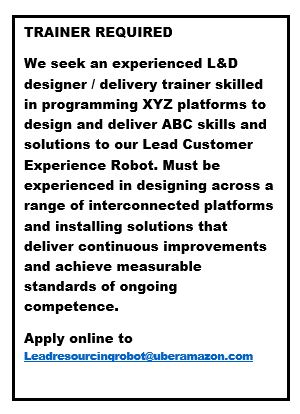I recently had the pleasure of talking to a Business Psychologist about the characteristics displayed by both good and not so good sales people. Some of the questions posed certainly caused me to think and reflect on how selling has changed over the past few years.
Go back a few decades in time and selling was a competitive and testosterone fuelled world, with certain sales people doing anything to close a deal. Top performers received superstar status generating mind-blowing commission incomes for their efforts. League tables were published showing the; who, what and how much was produced and earned. New recruits joining the business back then were shown the results and told that they too could soon be enjoying the fruits of their labours. Estate agents, double glazing, insurance, car, photocopier, time share, in fact sales people from a wide range of sectors had seemingly all caught the competitive ‘bug’.
65% of children entering primary education today will end up working in industries we haven’t thought of yet.
Sadly, few actually made it and it wasn’t long before some of the high pressure sales practices were uncovered and thankfully banished forever. Attention turned towards the customer, and rightly so.
Fast forward to February 24th 2016 and I was interested to listen to Alec Ross an ex-innovation adviser to the US government talking about his book ‘The Industries of the Future’. He confirmed what many of us already knew that 65% of children entering primary education today will end up working in industries we haven’t thought of yet. This certainly happened to my children and that was 20 years ago!
He went onto to say, those working in sales will probably find many of their jobs being done by machines in the future. Autonomous cars, planes and trains are just some of the more high profile sectors undergoing change right now. Think about it, we don’t actually need a sales person to sell us a ticket today, we do this online without any human interaction. It’s a fact that many sales roles in this arena will go.
According to a report from the British Retail Consortium published this week, 900,000 retail jobs could go by 2025. That’s just 9 years away! Increasing pressures from online retailers will continue to grow as customers spend more of their time browsing and shopping online. The convenience and competitive pricing of online shopping will continue to attract customers away from the High Street, and those that think it won’t happen to them had better think again.
We have just seen the demise of BHS after 100 years of trading. That will see c.11, 000 people lose their jobs and another of our High Street stores will be lost forever. As one retail commentator explained, ‘BHS weren’t a destination retailer’. I don’t think that they’ll be the last to fall but it’ll certainly make a few of the others sit up and think about their current proposition.
However, those sellers working in the higher end arenas might be lucky and possibly keep their jobs. Customers in these high end sectors might still want to talk to a sales adviser, someone to help guide them towards the right solution. That said, services will need to improve, the customer experience will need to be memorable and prices will probably stagnate as improvements and efficiencies are made in manufacturing. It becomes a tough conundrum to crack.
What of the solutions?
We could train our people to provide best in class experiences designed to provide memorable service for customers. There are those who say, if we train them they might be head hunted by the competition. However, if you don’t train them you could find out your business gets left behind to suffer the fate of those who didn’t bother to improve and develop their proposition. Training staff is one of solutions that must be explored along with a review of the product / service and overall proposition.
Back to my meeting with the Business Psychologist. As we discussed the characteristics of good and not so good sellers it becomes ever clearer those in sales will need to have certain skills to enable them to succeed in their jobs. They need to be able to build rapport with a wide range of customers whilst at the same time be able to identify certain customer behaviours. They will need the ability to ask a wide range of questions, questions designed to help uncover a customer’s needs and wants. They will also need to be able to listen to and analyse customer’s responses in order to create the solution the customer seeks. All of this can be trained and there’s a mass of content readily available on the internet if you know what you’re looking for.
But wait, a machine can do most of that! Probably so, but will a machine be able to add that person interaction, bring the human touch to the experience?
What will be the prized characteristics of our future sales person?
Although not a definitive list of characteristics, I believe that an ability to;
- meet and build rapport with others will be vital
- devise and ask questions designed to uncover a customer’s needs and wants
- listen to responses and create solutions that meet the customer’s needs and wants
- analyse relationships within data sets which identify where performance can be improved
- build ongoing enduring relationships with customers to enhance the customer experience
- have thorough product knowledge and how its benefits the customer
- have a thorough understanding of the competition and market sector
- demonstrate passion and enthusiasm for the product
I’m sure you’ll be able to add others to the list but as you grow the list ask yourself a question, when did you last meet a seller who displayed all of those characteristics? This person becomes a rarity and as such a real asset to their organisation.
The industrial revolution of the 18th and 19th centuries brought changes on a scale never seen before. The spinning wheel took industry from the home and put it into the factory. Today’s Data Revolution will see many jobs across a range of sectors vanish or change into something else. Selling in the 21st century will be one of those job roles that vanish unless those in it can build and adapt their skills to meet the needs of the marketplace and deliver an experience the likes of which can never be replicated by machines.
But it’s not just about those individuals involved in selling, it’s also about organisations looking to evolve and expand their businesses into new sectors. Richard Branson has done a good job diversifying into other sectors. Amazon has recently gone into partnership with a supermarket chain to deliver food.
So where are the opportunities of the future?
Where will those people in sales roles go? What about those in the learning and development sector? As I said earlier, there’s a mass of content already on the internet so why use someone to train people? E-learning has provided part of the solution, new apps and curated media will help to complement our future learning and development needs. Those of us in the L&D sector will not be immune to change, we should be seeking to embrace new media and methodology plus investigating how it can be used to enrich the lives of people, businesses and a wide range of organisations.
Today many organisations are working towards producing robotic solutions that will closely mimic their human counterpart. Robots will not require huge data banks of knowledge strapped to their backs, they will simply be connected to the internet via the cloud and it’s up there where algorithms exist that will provide the robot with directions and answers. In 20 years from now those in sales and L&D roles had better evolve or accept that their roles will be taken by something that exists in the real world but gets its directions and guidance from the virtual world – the cloud.
That will surely spell the end of the competitive, testosterone fuelled world of high pressure sales. After all I simply cannot see a robot resort to doing anything just to close the deal! But you never know, we live in interesting times…….
Just a thought to leave you with, this could be an advert for a training job in the future.





